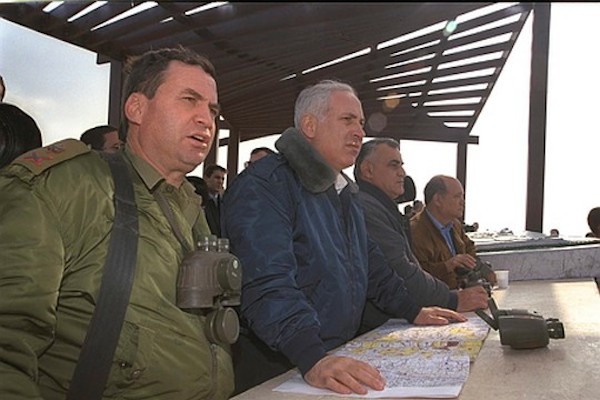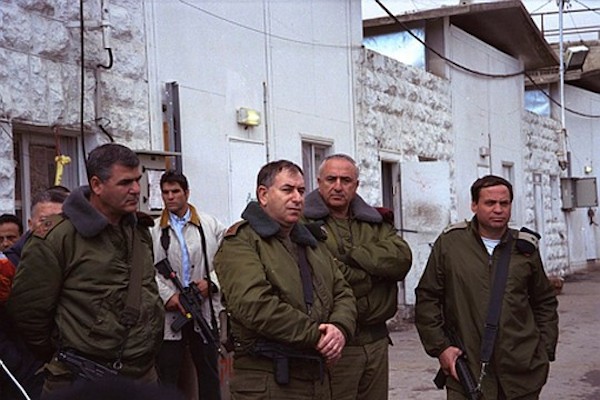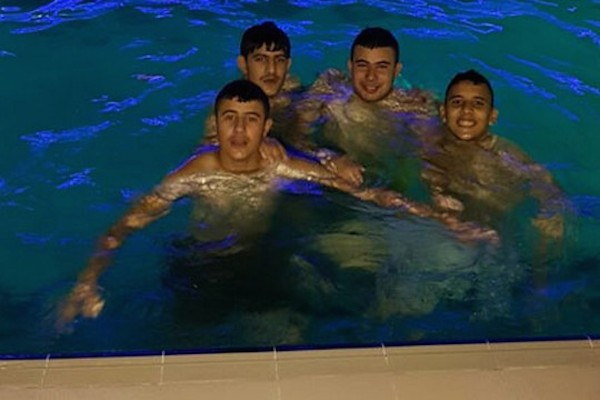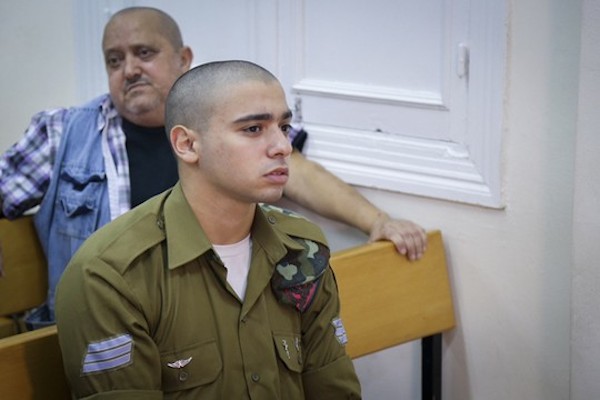Maj. Gen. Uzi Dayan was trying to support a soldier charged with killing an unarmed Palestinian. Instead, he ended up confessing to a crime that could have severe repercussions at The Hague.
By Yael Marom and John Brown*

Late last week, Channel 2 news reported that three senior reserve officers — Maj. Gen. Uzi Dayan, Brig. Gen. Shmuel Zakai, and Gen. Dan Biton — will testify for the defense of Elor Azaria, the Israeli soldier who is on trial for shooting and killing a Palestinian who stabbed an IDF soldier in Hebron, though he was already immobilized.
Zakai had previously posted on his Facebook page that Azaria’s treatment “is disgraceful and rife with hypocrisy, and principally unprofessional.” Dayan argues that the Military Police Criminal Investigation Division (MPCID) shouldn’t be the body designated to investigate such incidents, but rather an internal investigation committee.
A few weeks ago Dayan broke silence in an interview with Radio Darom in which he declared his stance on Azaria’s trial, explaining the normative mode of behavior the army needs to adopt:
I had a similar more grave case, much more grave, in which five Palestinians were killed by paratrooper combatants at the Tarqumiya crossing. Not only were they not terrorists, they also weren’t illegal aliens. They were people returning from work in Israel and there was some misunderstanding. I stopped the soldiers, though they really didn’t like that at the time…I said, for three days you’ll conduct a commission of inquiry and give me the results. Not the MAG the MPCID, nor anyone else – you give me the results…I saw the results. I said four things, conclusions, what needs to be done, the soldiers didn’t even go on trial. Today the situation is different in the sense that there are immediate photos and the entire press is involved, there’s a lot of pressure on decision-makers.
But did this really happen? And if so, what was the purpose of Dayan’s boasting, which by all accounts should lead to a criminal investigation against him? And what are Azaria’s attorneys hoping to achieve by bringing in his irrelevant testimony? We will try to answer all these questions, but first let us focus on the event Dayan spoke about.
The story
On March 10, 1998, at about 6 p.m., a white van carrying 12 Palestinian laborers heading home from work approached the Tarqumiyah crossing, between Israel and the southern West Bank. As the van entered the checkpoint, it veered slightly to the right, hitting one of the soldiers lightly. The soldier would later say that it wasn’t an accident, and that he saw “rage coming out of the driver’s eyes.” The soldiers, apparently aware of an alert issued the previous day of an imminent car-ramming attack, thought they saw one unfolding and opened fire. Three passengers were killed and another two were injured.
The head of the IDF’s West Bank division at the time, Brig. Gen. Yitzhak Eitan, initially claimed that “a preliminary investigation yielded that an attempt was made to run over a soldier, and the checkpoint staff responded accordingly.” However, eyewitnesses told Haaretz reporters Amos Harel and Sami Sokol that the van changed lanes because it had an Israeli license plate, and the driver noticed he was entering the Palestinian-only lane. The very same night, then-Prime Minister Benjamin Netanyahu phoned Yasser Arafat and extended his condolences. He later dubbed the incident “an unfortunate mistake.”
A week later, one of the surviving passengers told Haaretz that “the soldiers opened fire after another was waving towards us to move forward. One soldier didn’t see him and, thinking we were about to break through, started firing.” A report by Israeli human rights group B’Tselem the following year quoted an IDF investigation saying that the cause of the incident was faulty brakes.
Over the last few weeks, this case has been vaunted repeatedly by Dayan as an example of how errant shooters should be treated by army commanders. As GOC, Dayan was responsible for the lives of millions of occupied Palestinians, yet repeatedly and unflinchingly showcased the intricate cover-up apparatus of the most moral army in the world. Perhaps unwittingly, he drew the attention to the true culprits: the Dayans and the Ashkenazis, the Sharons and Baraks, and all the other generals (not to mention generations of cabinet ministers).

Brutally simple bottom line
Dayan’s bottom line is brutally simple: Azaria’s commanders failed at covering up. They didn’t do what the army expected them to do. They aired the dirty laundry in public. Azaria’s commanders should have done as he did and spare him the trial. And, of course, it would have been a lot simpler without those damn cameras.
Dayan’s memory of the incident was a bit hazy – the military police did launch an inquiry that yielded no results – but essentially he was right: the soldiers were not punished for killing innocent people.
Dayan is also right in saying that had Azaria not been caught on camera killing an immobilized person, he too would not have ended up in court. In fact, he’s only half-right: concrete evidence is often a prerequisite for an indictment, but it’s not enough either. It has to be made public. When it isn’t, like in the case of Samir Awad, who was shot in the neck, the prosecution can get away without pressing charges. This may well be the reason for the gag order on the killing of two Palestinian siblings at Qalandiya checkpoint last May.
The most serious consequence of Dayan’s revelations is that the cover-up has been effective, which means that killing innocent people with impunity is likely to continue. The examples that follow are just a sample of such cases, in which an inquiry was launched and amounted to absolutely nothing.
One of the most major shortcomings of these inquiries is the debriefing that often precedes them. In it, all the players and witnesses are brought together to recount what they saw. That gives them an opportunity to doctor their versions and adapt them according to the others’. This is why the police investigate crime suspects separately – and the fact that it’s not done in these cases comes at a price. What’s more, Dayan’s remarks may well amount to a criminal offense insofar as he admitted that his stated goal was to pervert the course of the investigation.
As long as the occupation itself
A mere two months ago, at 1:30 A.M., a Kfir Brigade officer responded to stone throwing on an Israeli car by standing on a low bridge above the highway and opening fire at a random Palestinian taxi that happened to pass by. Mahmoud Badran, 15, was killed, four of his fellow passengers were wounded and the driver was shot in the head. They were on their way home from a day at an amusement park in a nearby village.

The next day, the Israeli media reported that “a 15-year-old terrorist was killed,” but it soon transpired that it was an IDF Spokesperson’s press release copied verbatim. The shooter has yet to be arrested, even though he clearly broke the army’s rules of engagement several times. Here, too, it is likely that the shooting was documented only because there happened to be an IDF camera at the scene, as we were shown by the victims’ lawyer.
Another noteworthy incident took place on January 20, 2011, at around 10:30 P.M. Jalal Masri, a truck driver and father of two toddlers from East Jerusalem, was on his way to visit relatives near Hebron. When he drove past a makeshift checkpoint outside Hebron, a soldier shot him four times in the neck.
During his investigation, the soldier said he was aiming at the wheels, but the fact that the car’s windshield was sprayed with bullets contradicted that. Despite that, the case was closed for lack of evidence. Two separate inquiries were launched, after the military prosecution claimed the first was marred by the investigators’ exposure to the debriefing report. This is, by the way, exactly what happened in Elor Azaria’s case. Emily Schaeffer Omer-Man, a lawyer for Yesh Din, petitioned the High Court against the decision to discontinue the investigation.
If you think this is a recent norm, yet another marker of Israel’s moral deterioration, think again. A 1994 B’Tselem report includes a multitude of such stories.
Take this one, for example: on July 24, 1992, soldiers opened fire at a car near Khan Younis and killed a four-year-old boy. The victim’s father, who drove the car, said he misunderstood the soldiers’ instructions, who were signaling him to stop, and turned right. Once he did, he was met with a salvo of bullets. Haaretz quoted then-GOC Southern Command Matan Vilnai: “We killed a boy. It’s just not worth it. When you look into the story, you realize that his father had just bought a new car and took his family for a ride for the first time. He was so excited about the new car that he missed the checkpoint, made a turn, and then the soldiers killed the boy. It’s just not worth it.” None of the soldiers was ever indicted, even though the fire, which wasn’t aimed at the wheels, was opened illegally.
The victims aren’t just innocent car passengers. On May 4, 2006, a taxi driver parked his car outside a West Bank checkpoint and walked about 400 meters to the other side. A jeep carrying four soldiers was rushed to the scene and upon its arrival two soldiers disembarked, without notice, one shooting in the air and another toward the man’s back. The soldiers would later claim that they felt they were in danger. The investigation was discontinued after the shooters could not be identified. They were later identified in a civil action brought against them, in which the judge ruled they were lying. The military prosecution refrained from pressing charges nonetheless.
And this list is as long as the occupation itself.

One step toward The Hague?
The rationale behind Dayan’s subpoena is probably to make a case for selective enforcement. However, it doesn’t hold up. An 18-year-old isolated case is unable to establish this claim. The prosecution could claim, with a great degree of justice, that the investigation policy changed in 2011, when the army made a formal pledge to investigate every killing of Palestinians, and that whatever happened before simply does not apply.
And regardless, can a sex offender claim in his defense that many men commit sexual assault and get away with it? In truth, military judges will never admit that they themselves are the cover-up apparatus.
Dayan’s testimony would be of no assistance to Azaria. In fact, it could only harm his case. The judges would take note that the similar case presented by Dayan included wrongdoing, and by endorsing the testimony the defense would admit that it is the case here as well.
Dayan’s testimony, once it made it to the minutes, would give ammunition to calls to investigate IDF soldiers internationally. To date, Israel’s main claim to fend off these calls was that it has an independent investigative apparatus that ensures that justice is upheld. When a top officer admits to interfering in the process, it casts serious doubts on the effectiveness of the process.
Anticipating defeat, Azaria’s defense team seeks to recruit Dayan into an effort to make a political statement whereby killing Palestinians should not be considered a criminal offense. It clashes with the stance championed by the IDF top brass, and the casting of an old-timer serves the purpose of harking back to the army of the good old days, before it was hijacked by the current commanders.
When Dayan delivers his testimony on August 28, Israeli police will be legally bound to launch an investigation against Dayan and the Tarqumiyah shooters. There is no statute of limitation on murder cases, and the culprits could still be indicted. If that doesn’t happen, Israel will find itself in a very awkward position, one that might only be redressed by the International Criminal Court in The Hague.
Yael Marom is Just Vision’s public engagement manager in Israel and a co-editor of Local Call. *John Brown is the pseudonym of an Israeli academic and a blogger. This article was first published in Hebrew on Local Call. Read it here.


